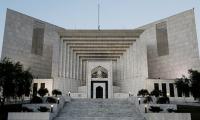A three-day workshop organised in Karachi by the Peace & Education Foundation (PEF) has come to the conclusion that religious scholars hold the key to solving sectarian intolerance.
The participants agreed that religious scholars should propagate a narrative of co-existence with and across sectarian divides, and diminish the level of violence and conflict driven by sectarianism.
This was the crux of the workshop attended by religious scholars of various schools of thought. PEF chief Azhar Hussain, Jamaat-e-Islami central deputy chief Asadullah Bhutto, Jamiat Ulema-e-Pakistan-Noorani Sindh chief Aqeel Anjum Qadri, and religious scholars Allama Shah Hussain Gardezi, Dr Younas Siddique, Ali Karar Naqvi and Imtiaz Javed were the key speakers.
Veteran journalist Wusatullah Khan, University of Karachi teacher Dr Muhammad Ishaq Alam, Maulana Israr Madni of Darul Uloom Haqqania in Akora Khattak, Mufti Muhammad Zubair and the PEF’s Mujtaba Rathore lectured on various topics.
The participants of the workshop held a discussion to identify the common avenues for the promotion of peace and sectarian harmony among various sects. They agreed that there were more commonalities among the Islamic sects than differences, and efforts should be made to promote the commonalities to promote sectarian harmony.
The workshop identified five fundamental issues in the context of sectarianism in Pakistan:
(1) Mindset condoning takfeer, and issuing edicts against others for being unfaithful, nonbeliever and blasphemous;
(2) Using theological arguments and religious metaphors to justify violence against opponents (forbidding evil, fitna, jihad, qatal);
(3) Internal causes of faith-based extremism and violence (bigotry, creation of institution on the basis of religious sects, economic interests, psychology of reaction, social division, issues of identity, state’s religious narrative, sources of faith-based violence);
(4) International and external factors involved in sectarian strife (international conspiracies, division in the Islamic world by sects, interests and objectives of global powers in the region); and
(5) Fear of hindrance to sectarian harmony emanating from within the religious orders.
The participants agreed that a marked reduction in sectarian violence in Pakistan would be possible by implementing the narrative of sectarian reconciliation.
Some of the recommendations made at the workshop included making sectarian reconciliation part of the Friday sermon and other religious discourse and education, rephrasing religious terminologies used by extremist elements in the backdrop of the contemporary situation, and reinterpreting concepts such as condemning evil, fitna and jihad by scholars of all sects.
Other recommendations included issuing a consensual edict on an important matter instead of getting it from any one religious scholar, making efforts to solve misunderstandings among different factions through intellectual engagement, avoiding any discussion involving faith and religious debate, and arranging frequent meetings of followers of every sect with one another.
Jamaat-e-Islami interim emir Munam Zafar speaks during a press conference on April 25, 2024. — Facebook/Jamaat e...
Sindh Chief Minister Syed Murad Ali Shah speaks at The Citizens Foundation event: “Greatness of Spirit in Karachi:...
Nasla Tower's demolishing works can be seen in progress on Sharea Faisal in Karachi. — PPI/FileThe Supreme Court on...







